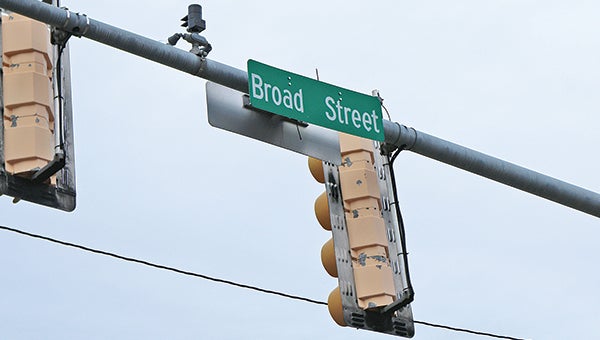Over 20 road projects could receive funding with Gov. Haslam gas-tax proposal
Published 6:05 am Friday, January 20, 2017

Star Photo/Curtis Carden
If a new gas tax were to go in effect, the state is hoping to generate enough revenue to begin work on different roads across the street, including the West Elk Avenue road project, that includes Broad Street.
The backlog can be overwhelming at times.
Taking into consideration the work that needs to be accomplished to help further sustain growth, Tennessee Gov. Bill Haslam announced this week a strategic plan to cut taxes of food and manufacturing while updating the state’s transportation.
It is all part of the governor’s “IMPROVE ACT” (Improving Manufacturing, Public Roads and Opportunities for a Vibrant Economy), which was announced on Wednesday, Jan. 18, as the first piece of Haslam’s Next Tennessee legislative plan gear for the next generation of Tennesseans.
“Under the conservative fiscal leadership of the General Assembly and this administration, state government is smaller, $500 million in recurring costs have been cut out of the state’s operating budget, and together we’ve cut taxes by $270 million annually,” Haslam said. “Because we are a smaller, less tax reliant state government, it is time to build on the vision of what the future of Tennessee looks like and requires. This proposal is the next step in the conversation about how we’re going to position the state to address expected growth, maintain Tennessee’s economic momentum and remain competitive as we continue recruiting high quality jobs.”
The IMPROVE Act would increase the road user fee by 7 cents for a gallon of gas, 12 cents for a gallon of diesel and increase registration fees by $5 for the average passenger vehicle. The act would also place an annual road user fee on electric vehicles and increase charges on vehicles using alternative fuels.
According to the governor’s office, the proposal also includes a three percent charge on rental cars and changes the state’s open container law to “allow the Tennessee Department of Transportation (TDOT) flexibility to use $18 million in existing federal dollars on the roads.”
According to a statement issued by the office, the administration is estimating the taxes would raise an additional $278 million a year to be split between the state and local governments.
“… limiting the impact on the average Tennessee motorist to approximately $4 a month. All funds would go toward transportation, including the 2 percent typically reverted to the General Fund, to provide funding for 962 projects across all 95 counties plus an additional $39 million to cities and $78 million to counties. The legislation would also allow municipalities, only if approved by local voters through referendum, to impose a surcharge on their sales tax rate that would be solely dedicated to public transit projects,” the release from the governor’s office read.
The proposal is an idea to start generating revenue for more than $10 billion worth of projects and improvements needed across the state.
In Haslam’s announcement, TDOT unveiled nearly 1,000 projects across the state needed, with Carter County needing over 20-plus.
With the bulk of projects coming from state and local bridges, the hefty price total is coming from the right-of-way project on West Elk Avenue — which is expected to go from SR-67 (US 321) to SR-37 (US-19E). The project is expected cost roughly over $22 million. With the project expected to start up in the spring of this year, there is a possible halt right after due to the backlog of other projects needing funding.
Multiple projects could be on the way in Carter County if funding were to come with the implementation of the gas tax.
The list of projects unraveled by TDOT include:
• Southside Road Bridge over Gap Creek
• Big Sandy Road Bridge over Stoney Creek
• Reeser Road Bridge over Buffalo Creek
• Sugar Hollow Road Bridge over Doe River
• Honeycutt Street Bridge over Doe River
• Old SR-67 Bridge over Laurel Fork Creek
• Crow Road Bridge over Laurel Fork Creek
• Earl Williams Road Bridge over Stoney Creek
• Estep Hollow Road Bridge over Stoney Creek
• Cove Creek Road over Doe River
• Ensor Graveyard Road Bridge over Stoney Creek
• Howson Road Bridge over Little Doe Creek
• Stevens Road Bridge over Little Doe River
• Gov. Alfred Taylor Road Bridge over Buffalo Creek
• West G Street Bridge over Gap Creek
• Railroad Grade Road Bridge over Bear Gage Road/Doe River
• Gap Creek Road Bridge over Gap Creek
• Smalling Road Bridge over Watauga River
• Stout Hollow Road Bridge over Laurel Fork Creek
• Dennis Cove Road Bridge over Laurel Fork Creek
• Paul Blevins Road Bridge over Tiger Creek
• Hillside Drive Bridge over Doe River
• Blevins Hollow Road Bridge over Stoney Creek
• Crabtree Road Bridge over George Creek
• Powell Road Bridge over Hampton Creek
• Danner Subdivision Road Bridge over Stoney Creek
• Estep Loop Bridge over Stoney Creek
Johnson County could also reap the benefits from the gas tax. With five projects potentially coming, the biggest comes with a rural access project that would be from Cold Springs Road to the Virginia state line, spanning nearly eight miles and estimated to cost $90 million to complete.
Other projects in Johnson County include:
• Stage Coach Loop Bridge over Doe Creek
• Forge Creek Circle over Forge Creek
• Little Dry Run Road Bridge over Roan Creek
• Slim Branch Road Bridge over Roan Creek
According to the governor’s office, additional pieces of the NextTennessee plan will be announced in the coming weeks with Gov. Haslam scheduled to deliver his State of the State address on Monday, Jan. 30.
A follow up on the potential new act will be appear in future editions of the STAR.





